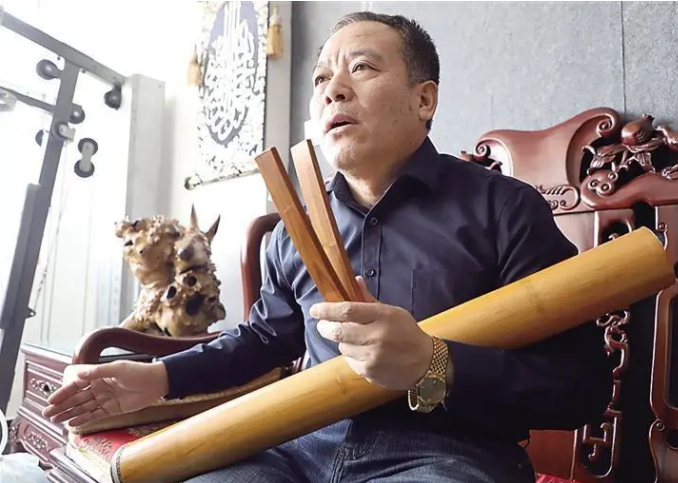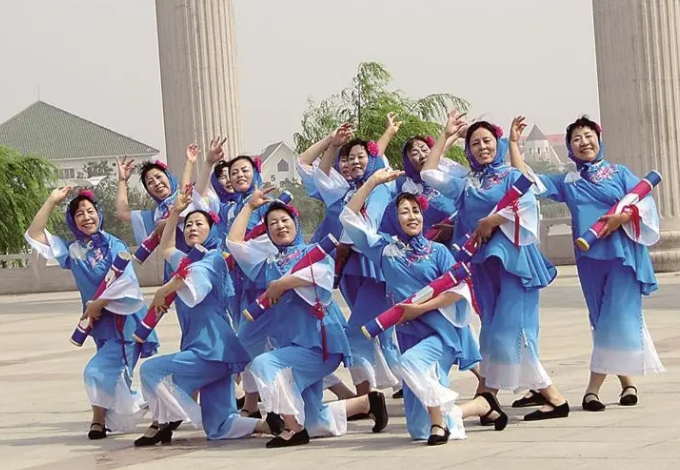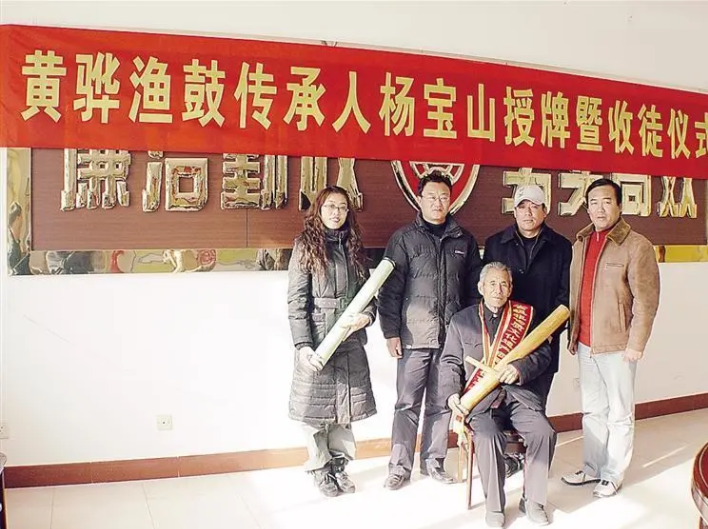Traditional rap art "Huanghua Fishing Drum" sings ancient rhymes
Huanghua fishing drum is a kind of traditional rap art, which belongs to the form of board cavity folk art. It originated in Fengjiabao by the Bohai Bay and is sung in local coastal fishing villages. In 2006, Huanghua's fishing drum was included in the provincial intangible cultural heritage list.

Wang Hongshan
"The fishing drum was originally reserved by the gods, and the rocking horse trembled. It fell into my hands today. I didn't sing "Journey to the East" or "Journey to the West", and I didn't sing "Journey to the East" and "Journey to the West". …”
At the Rong Media Center in the Bohai New Area, 56-year-old Wang Hongshan played and sang Huanghua fishing drums to visitors using only a fishing drum tube and a pair of simple boards.
The dialects and slang words in the lyrics, the strong local flavor, and the soothing drumbeat, accompanied by the slow spring breeze blowing outside the window, seem to bring people to that ancient seaside village...

The love between fishing drums and fishermen from generation to generation
After singing a few stanzas, Wang Hongshan said with emotion: "I really miss watching the lively scene of old people in the village singing fishing drums when I was a child!" The folk art of fishing drums has been sung in Huanghua for more than 200 years. It was once used by local fishermen to entertain themselves in their spare time. main form of entertainment.
According to legend, Huanghua's fishing drum was taught by a fishing drum artist from a foreign country who lived here due to famine during the Qianlong period of the Qing Dynasty.
"It was an early winter in the Qianlong period, and the fishermen were resting at home. One day, the sound of 'bang, bang, bang' was heard from the South Street, accompanied by drums and rap. People went out to see what was going on. , Judging from the rapper's clothes, he is a beggar. Although this man is a little old, he is in good spirits." In Wang Hongshan's narration, the origin of Huanghua's fishing drums is vividly displayed in front of him.
The old man sang a piece from "Journey to the West", "The Monkey King was born". The whole village loved to hear it, so they discussed to keep him. The big guys get together to cover him with meals and let him sing the whole book.
"The old man finished "Journey to the East", said "Journey to the West", sang "Journey to the East" and sang "Journey to the West", finished teaching "Journey to the North" and taught "Journey to the South"... From Xiehai to the spring flood, for several months, the village Every day is like the New Year, and some people also learn to fish drums. Since then, Huanghua's fishing drums have taken root in Fengjiabao. Since then, we have passed on from generation to generation." Wang Hongshan said excitedly.
The name "Huanghua Fishing Drum" was established in the early 1980s. At that time, the fishermen directly called the singing of fishing drums as "playing fishing drums" or "three-sentence bends". On the days when incense is offered at the Fishbone Temple, some people sit on the beach in front of the temple and raise their voices. When other fishing villages saw that this thing was very interesting, they followed the apprenticeship to learn the art and enjoyed themselves.
As a result, it was spread by ten, ten by one hundred, and there were people who held fishing drums in every village of Haibao, and later expanded to some places in the inland. The fishing drum really entered the life of the fishermen.

apprenticeship ceremony
Unique performance
Huanghua Yugu, as a genre of fishing drum and Taoism, is quite different from the similar genres in other places in our province. Although it is said that it is a type of music imported from other places, after comparing with "Chinese Quyi Music Integration Shandong Volume" and "Chinese Quyi Music Integration·Henan Volume", there is no similar music form.
"Our fishing drums have a fixed tune. If you move a little, the tune will change. It is not Huanghua's fishing drums." Wang Hongshan said.
Huanghua fishing drum is an art form that combines board cavity and qupai style. The rap form is mainly group sitting singing, and there are also solo singing and duo singing. It is simple and easy to perform and suitable for folk popularization. Musical rhythm long and short coexist, allegro and adagio. The music cards include Playing Babies, Sanpuqi, etc. In addition, there are rhyme whites, side whites, introductions, and poems.
The production of Huanghua's fishing drum instruments is made of local materials, which makes it have a unique rhythm. "One end of the bamboo tube is sealed with fish skin, and it is made into a fishing drum." Picking up a pair of simple boards and a fishing drum tube, Wang Hongshan said, "The simple boards are made by fishermen from hardwood leftovers left over from fishing boats, with appropriate curvature. The curved, crisp sound. The fishing drum tube is made of bamboo poles with a certain thickness used by fishermen to make nets, and the drum surface is made of sole skin. Its thickness, length, thickness of the cylinder wall and fish The tightness of the skin drum head is designed just right, the resonance is strong, and the sound is strong.”
"In the old days, the fishermen also regarded the fishing drum as a kind of 'head-calling', to attract customers when they went to the inland countryside to sell seafood. Get together and sing some fishing drum pieces, entertain yourself, and be very lively." Wang Hongshan said.
In the inheritance of more than 200 years, Huanghua Yugu has absorbed the nutrition and essence of local folk songs, and has continuously enriched and improved it, gradually evolving into a unique song with a lively rhythm, a comfortable tune and a strong local flavor.
Huanghua Yugu's singing bibliography "Journey to the South", "Journey to the North", "Journey to the East" and "Journey to the West", are all unseen in other genres. From the point of view of singing and art literature, it is also unique.
Ancient folk art comes to life
56-year-old Wang Hongshan is the fourth-generation inheritor of Huanghua's fishing drums. He has a wide range of hobbies since childhood and is full of curiosity about anything related to art. In his childhood, Murakami's fishermen sang fishing drums while working on the beach, which he will never forget to this day.
In 2006, Wang Hongshan came up with the idea of learning and inheriting the fishing drum opera, and took the initiative to find Yang Baoshan, an old artist and the third-generation inheritor of Huanghua's fishing drum, to apprentice.
At the end of 2008, under the organization of Huanghua Cultural Center, a teacher apprenticeship ceremony was held in Fengjiabao Village. Wang Hongshan, He Wenhong, Zhao Xiaoxi and Yin Rulai also formally apprenticed to Yang Baoshan to learn Huanghua's fishing drums.
"In the spring of 2012, Master's sudden death from illness touched me a lot. After that, I repeatedly studied the CD-ROM recordings and singing lyrics that Master left behind during his lifetime. Singing style." Wang Hongshan said.
For many years, Feng Baogang, curator of Huanghua City Cultural Center, who has been excavating, sorting out and protecting intangible cultural heritage, has done a lot of research on Huanghua fishing drums. According to Feng Baogang, the earliest record of Huanghua's fishing drum performance was probably during the Tongzhi period of the Qing Dynasty. The first-generation artists Yang Wenbing and Wang Qibin once went to Jinan, Shandong with more than a dozen people in costumes to sell jellyfish and shrimp paste. The small fishing drum dramas "Three Degrees of Lin Ying", "Yang Zongbao's Removal of Troops" and "Life" performed on the streets of Jinan were very popular with audiences. , so left the "small fishing drum top drama" story.
Feng Baogang said: "The heyday of Huanghua's fishing drums was from the 1950s to the 1970s. A performance team of 40 to 50 people was active in the coastal area of Huanghua with Fengjiabao as the center, and they performed more than 30 repertoires. In August 1964, Beijing held the 'National Rural Literature and Art Performance'. After the Huanghua fishing drum performance team was selected, they came to Beijing to report performances with such repertoires as "Bohai Style" and "The Communist Party's Grace". Their performances were well received."
"In 2008, under the organization of the Huanghua City Cultural Center, Yin Rulai and other brothers and I combined our own strengths to make some innovations in Huanghua's fishing drums, perfectly introducing the elements of fishing drums into dance, and created a collective dance program "" Bohai·Women·Drums" won the second prize in the dance category of the 9th Provincial Yanzhao Qunxing Award for the elderly." Wang Hongshan said.
In recent years, due to the influence of various objective factors and the successive deaths of old artists, there are very few actors, especially young actors, who can fully sing the lyrics and music of Huanghua Yugu.
In order to let local children know about fishing drums, under the organization of the Culture and Tourism Bureau of Bohai New Area, Wang Hongshan has participated in many activities of intangible cultural heritage entering the campus. In recent years, he has also taught three young people in the village to learn fishing drums.
"In recent years, people have gradually attached importance to traditional literature and art, which is a good opportunity. I insist on starting from myself, constantly researching and publicizing, and doing my part for the protection of traditional culture. I believe that the original juice of fishing drums The original local culture will definitely be passed down." Wang Hongshan said.
 渝公网安备 50010702504639号
渝公网安备 50010702504639号